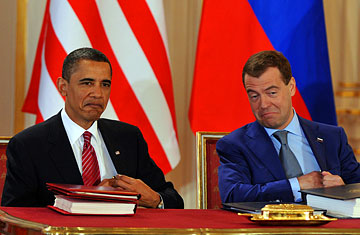
U.S. President Barack Obama and Russian President Dmitri Medvedev signed the START treaty on April 8, 2010, but Obama will have a hard time getting the Senate to ratify it
Congressional Republicans have mostly been bystanders in the foreign policy arena over the past 18 months, unable to muster the votes to block President Barack Obama remaking U.S. foreign policy to fit his more diplomatic, consensus-building vision. But now, with months to go before the midterm elections, they are flexing their muscles: for the first time in his presidency, Obama needs a super-supermajority of 67 Senators — including at least eight Republicans — to ratify the new START nuclear arms–control treaty with Russia, a cornerstone of his plan to seek the eventual elimination of atomic weapons.
For weeks, the White House, the Pentagon and Senate Democrats have been working overtime to cajole, convince and placate Republicans who have raised concerns over the treaty's details, the ongoing efforts to modernize the nuclear-weapons force and the future missile defense. But the efforts have not yet borne fruit, as Republicans continue to ask for more assurances.
On Tuesday, Foreign Relations Committee chairman John Kerry decided to delay a scheduled Wednesday-morning vote on the treaty until mid-September, a setback that puts at risk the White House goal of ratifying the treaty before the end of the year. "Similar arms-control agreements have passed by overwhelming majorities, and it is the Senator's hope that this one too will be passed by an overwhelming majority," said Frederick Jones, a Kerry spokesman, earlier in the week.
"There is still time to get this done," says Kingston Reif, the director of nuclear nonproliferation at the Council for a Livable World. "It sets up a September endgame for the new START." But Reif's vision may be optimistic. In the heat of a campaign season, Republicans will have even less incentive to give Obama a foreign policy win. For months, Senate aides have complained that the entire ratification process is being rushed, saying more time is needed to review the full record and get answers to additional questions. "This notion that [ratification] is going to happen before November is completely absurd," says one Republican Senate aide. "It reeks of politics."
With the exception of one Republican, Indiana's Richard Lugar, no one from the party has yet indicated support for the treaty. And many Republicans, from sitting Senators to would-be presidential contenders, have expressed serious reservations. The outstanding issues range from technical questions about funding for new laboratory buildings at Los Alamos, N.M., and Oak Ridge, Tenn.; the fate of programs to train a next generation of nuclear engineers; and, in some cases, the charge that Administration negotiators conceded too much in talks with Russia. And then there are the pressures raised by the political calendar: Mitt Romney, a would-be 2012 presidential contender with no policy role in Washington, has been the most vocal opponent of ratification, authoring a Washington Post op-ed calling the treaty "Obama's worst foreign policy mistake."
Others like Senator John McCain, who faces a difficult primary in the coming weeks, have been tacking to the right on the treaty, raising questions about language in the treaty that even he admits has raised no concerns for the military. In a hearing on Thursday, McCain blasted the White House for agreeing to a "clear, legally binding limitation on our missile-defense options" in the treaty. The language in question would bar the U.S. from converting any more of its intercontinental-ballistic-missile (ICBM) sites to missile-defense locations, an option the U.S. military had already rejected as too costly and strategically risky. Analysts are concerned that a defensive missile launched from an existing ICBM base could be misinterpreted by the Russians as an offensive nuclear strike.
In recent weeks, Arizona Senator Jon Kyl and others have been meeting with Senate leaders and Vice President Joe Biden to discuss their concerns. Last Friday, Kyl joined South Dakota's John Thune, Tennessee's Bob Corker and Idaho's James Risch on a tour of the facilities at Los Alamos, but the group made no statement following the visit. The White House, also, has worked for months to address Republican concerns. "We have tried in many different ways to signal and make clear that the President is committed to the modernization of the nuclear-weapons complex," says a senior Administration official. President Obama has said that he wants the treaty ratified this year, and his aides have emphasized a lingering concern over maintaining a status quo in which both Russia and the U.S. lack access to verifying each other's nuclear activities. "The intelligence community would tell you that they would rather have more information than less," says the Administration official.
Negotiations between Republicans and the White House have so far mostly taken place in private. But if tensions continue to rise, the debate may become public, as some in the Republican Party clearly hope. Joseph Cirincione, a nonproliferation specialist at the Ploughshares Fund and a supporter of the treaty, sees a problem facing Republicans attempting to block passage from a hawkish posture. "They can't 'death panel' this treaty, particularly when you have every senior national-security strategist in the country supportive of it, including Republicans," Cirincione says. "To vote against this you would have to go against the recommendation of the U.S. military and the defense establishment."
Republicans opposing the treaty appear unlikely to be moved by Cirincione's warning. Not when they believe, as Romney wrote last month in language straight from the campaign trail, "The security of the United States is at stake."
